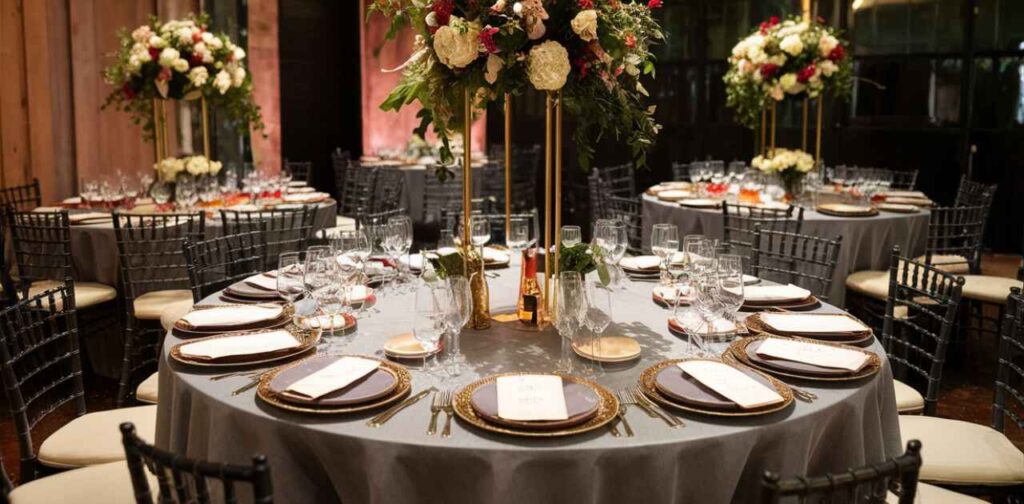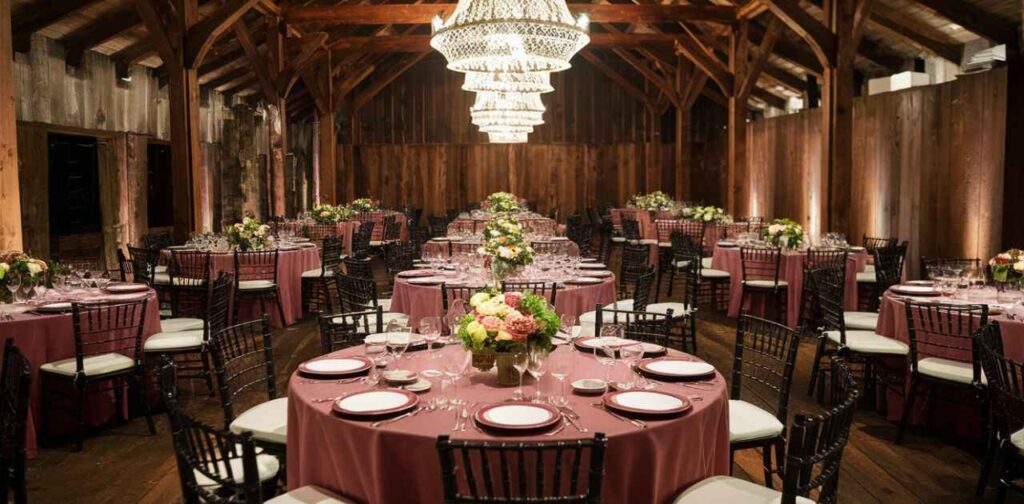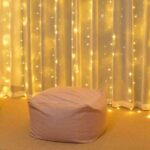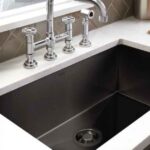Hosting an event, be it a wedding reception, corporate gala, or fancy dinner party, comes with its fair share of planning woes.
One critical aspect that often gets overlooked? Ensuring your tablecloths fit just right.
Get the sizing wrong, and you could be stuck with unsightly bunching, excessive draping, or worse tablecloths that simply don’t cover the tables properly.
Bid adieu to such sartorial table faux pas with this comprehensive guide on choosing the perfect tablecloth sizes for all your event table needs.
We’ll cover everything from standard table dimensions to clever sizing formulas, creative styling tips, and pro advice straight from seasoned event planners.
By the end, you’ll be a tablecloth sizing savant, ready to impress guests with an impeccably dressed tablescape.
Why Proper Tablecloth Sizing Matters for Events
While it may seem like a minor detail, getting the tablecloth size right can make or break the overall visual impact and ambiance of your event setup.
A well-fitted tablecloth lends:
- An air of sophistication and polish
- A cohesive, streamlined look
- The ideal drape for that coveted “opulent” feel
In contrast, ill-fitting linens can appear sloppy, amateurish and detract from all your other decor efforts.
As Deborah Briggs, veteran event stylist puts it, “The tablecloth is the canvas for your entire tablescape. Get that wrong, and even the finest china and florals won’t be able to save the visual.”
Let’s look at how an improper fit can quickly turn cringe-worthy:
- Tablecloths that are too small = Unsightly gaps and exposed table edges
- Overlarge cloths = Excessive fabric pooling or dangerous tripping hazards
- Uneven draping = A lopsided, sloppy appearance
The moral of the story? Taking a few extra minutes to nail those tablecloth dimensions can elevate your event decor from “meh” to magazine-worthy.
Standard Table Sizes to Keep in Mind
Before diving into sizing specifics, it’s crucial to understand the standard dimensions for common event table shapes and sizes.
Round Tables:
- 48″ diameter (4 ft)
- 60″ diameter (5 ft)
- 72″ diameter (6 ft)
- 108″ diameter (9 ft)
Rectangular/Banquet Tables:
- 6 ft x 30″
- 8 ft x 30″
- 8 ft x 40″
Square Tables:
- 36″ x 36″
- 48″ x 48″
While these are the typical sizes, keep in mind that custom or non-standard dimensions do exist. When in doubt, always measure your tables rather than assuming standard sizes.
Pro Tip: Use a metal measuring tape for accuracy and measure from the outermost table edges.
Failproof Formulas for Calculating Tablecloth Size
Now that you know the common table measurements, it’s time to learn how to calculate the ideal matching tablecloth size.
For Round Tables: Table Diameter + Drop Length = Desired Tablecloth Size
The “drop length” refers to how far you want the linen to drape beneath the table’s edge. A 12-15″ drop is considered medium/standard, while 18-22″ creates a more opulent, pooled look.
Example:
- 72″ round table
- Desired 15″ drop length
- 72″ + 15″ = 87″ tablecloth needed
For Rectangular Tables: Table Length + (2 x Drop) = Desired Length Table Width + (2 x Drop) = Desired Width
Example:
- 8 ft x 40″ rectangular table
- Desired 10″ drop
- Length: 96″ + (2 x 10″) = 116″
- Width: 40″ + (2 x 10″) = 60″
- So a 116″ x 60″ tablecloth would be needed
Visual Example:

While these formulas are a good starting point, you may want to size up or down slightly based on your preferred drape and look.
When to Size Up or Down
Minor tablecloth sizing adjustments can be made based on the following factors:
Chair Height
If using very short chairs (e.g. childrens tables), you may want to reduce the tablecloth drop by a few inches to prevent it from dragging on the floor.
For taller chairs, increasing the drop can create an elegant, sweeping effect.
Floor-Length
Preference Some prefer tablecloths that skim just a few inches above the floor, while others want a longer “puddled” look.
Increasing or decreasing the drop by 2-4 inches can achieve your desired effect.
Fitted vs. Oversized
A more fitted, tailored tablecloth provides a sleek, modern aesthetic. Go up 1-2 inches from the formulas for this look.
For a looser, billowy drape (great for enhancing opulence), size up the width by 6-8 inches.
Kid/Petite Tables
For kid-sized 48″ round or 4 ft rectangular tables, a 54-60″ square tablecloth is a handy option that eliminates complicated math.
Related Post:
Thehometrotters .Com Home Decor Ideas
Exploring Fabric Type and Care
Not all tablecloths are created equal when it comes to fabric and upkeep. The material you choose can impact sizing requirements slightly.
Polyester
A popular, budget-friendly choice that’s wrinkle-resistant. Polyester tablecloths may require slightly larger dimensions to account for less drape/giving.
Cotton
Luxurious yet requiring more maintenance (iron or steaming). Cotton linens conform nicely to table edges for a crisp look. Size down by 1-2 inches if desired.
Linen/Cotton
Blends Offer a balanced drape plus easier care than pure linen. Safe middle-ground for sizing.
Caring for Quality Linens
High-end fabrics like silk or damask may be prone to shrinking, so factor that in when purchasing. Always follow laundering instructions carefully.
When weighing splurge vs. save linen options, consider factors like:
- Frequency of event use (worth investing in higher quality if used often)
- Laundering capabilities (premium fabrics may require pro cleaning)
- Overall visual impact desired (formal white-tie affairs merit the splurge)
Creative Styling with Tablecloths
Who says tablecloths have to be boring? With the sizing mastered, you can now get adventurous with prints, colors and layering.
Pretty in Prints
From bold florals to classic plaids or Chevron patterns, printed tablecloths add an instant pop of personality. Pair with solid overlays or runners for contrast.
Color Brilliance
Vibrant solids like plum, emerald or sunny yellow can set the tone for themed events. Use shades that complement your floral/decor accents.
Luxe Textures
Craving an opulent look? Richly textured tablecloths in crushed velvet, sequined or embroidered linens elevate any tablescape.
Clever Layering
“The trendy look now is to mix prints and textures through layering tablecloths, overlays, and runners,” notes Allison Clark of Ava Design Co.
Start with a neutral base cloth, then add contrasting printed overlays or bold runners down the center.
Mix and Match
For an eclectic, boho vibe, use varying prints and colors across tables by mixing tablecloths, napkins and accents. Just keep the color palette cohesive.
Pro Advice from Top Event Planners
Wondering how the pros approach tablecloth sizing? We asked and they delivered:
“For weddings, I always tell couples it’s better to error on the side of too long versus too short. You can use ingenious clips to achieve a perfect puddle on the floor.”
Emily Clarke, Award-Winning Wedding Planner
“When ordering linens, I size up at least 2 inches in each dimension to achieve that coveted, full drape over tables. You can always knot or tuck beneath if needed.“
Jeanette Lewis, Corporate Event Stylist
“For a lush, opulent banquet look, we use shantung silk tablecloths and oversize them by 8-10 inches on the length and width. The extra fabric creates that glamorous, cascading pool all the way around.“
Adrienne Lewis, High-End Event Designer
“Don’t forget about serpentine or half-round tables when planning your linen sizing! The curved shape requires long, tailored cloths to navigate the winding contours.“
Jason Klessig, Restaurant/Hospitality Specialist
Serpentine & Unique Table Shapes
Speaking of non-traditional tables, how do you conquer sizing for shapes beyond basic rounds and rectangles? Here are some handy tips:
Serpentine Tables
These winding, curved designs are all the rage for creating flow and movement. Size as you would for a very long rectangular table, adding 10% to both length and width measurements for proper draping.
Half-Round/Partial Round
Also known as a “D-shaped” table, these semicircular pieces require a bit of geometry.
- Measure the straight edge for the length
- Measure the diameter of the curved side to determine the proper width/round portion
Look for specially designed half-round tablecloths or get creative by using overlays, runners and other accents to achieve coverage.
U-Shaped Tables
Another non-traditional option suited for conferences or classroom settings. The extended rectangular shape with a center cutout gets draped much like a normal rectangular table.
Just add 25% to both length and width measurements to properly cover the inner/outer curves of the “U”.
Highboy/Cocktail Tables
These tall tables for standing receptions and cocktail hours use linens too! Smaller 30″ round cloths or box-shaped coverings are available to neatly outfit the tabletops.
The general rule is to have the linen drape 6-8 inches below the surface edge for a clean, tailored aesthetic.
Renting vs. Buying Tablecloths
For those hosting frequent events, it may make sense to invest in your own linen collection. But renting tablecloths is also a cost-effective option if usage is more sporadic.
Benefits of Renting:
- No storage/laundering hassles
- Access to premium fabrics affordably
- Ability to scale up for large events easily
- More eco-friendly for one-off use
Most party rental companies offer linen packages with delivery/pickup included. Expect to pay $10-$30 per cloth, depending on size/material.
Buying Linens:
- More economical for frequent hosting
- Ability to mix/match colors & styles
- Avoids rental markups longterm
Hunt for linen sales/bundles online and at big-box stores. $25-$100 per cloth is the typical range for basic polyester to luxe fabrics.
Take good care through proper laundry, and they’ll last for years.
Care, Laundering & Storage Tips
To keep your linens looking their best, follow these simple care guidelines:
Polyeser/Cotton Blends:
- Can be machine washed on gentle cycle, using mild detergent
- Remove promptly from dryer to prevent wrinkling
- Press with hot iron if needed
Delicate Fabrics:
- Hand-wash or have professionally laundered
- Hang or lay flat to dry
- Iron while slightly damp for best results
Storage:
- Fold linens neatly after laundering/pressing
- Store in fabric bins or shelving units
- Add acid-free paper between layers to prevent creasing/yellowing
With proper care, your linens can withstand dozens of events and washings while maintaining their color and integrity.
Final Tablecloth Sizing Tips
To wrap up, here are some final easy-to-digest tips for mastering event tablecloth sizing:
- Always measure your tables first, don’t assume sizes
- Use online calculators or apps for quick drop cloth math
- Note seating heights to adjust drape if needed
- Buy or rent square/overlay linens for layered looks
- Splurge on higher quality fabrics for premium affairs
- Store linens properly between uses to prevent wrinkles
- Repurpose cloth sizes across table shapes where possible
Most importantly, don’t stress! With a little preparation using the guidance above, you’ll be able to flawlessly dress any table for any occasion.
FAQs: Frequently Asked Questions
How much extra fabric should I account for when sizing tablecloths?
The general rule is to add 12-15 inches to the table’s diameter or length/width to achieve a standard, puddled drape. For a longer, cascading look, add 15-22 inches instead.
Can I use a round tablecloth on a square/rectangular table?
While not ideal, you can get away with using a round tablecloth on a square table if the measurements work out. However, the draped corners may look bulky. For rectangular tables, the cloth won’t lay properly.
Do tablecloth sizes vary by brand/manufacturer?
Yes, slight measurement variations can occur between brands or even different fabric types from the same brand. Always cross-reference your specific product’s dimensions against your table size.
How do I determine tablecloth drop for uniquely shaped tables?
For serpentine, half-round or otherCustom shapes, it’s best to overestimate the length required and have a little extra fabric to play with for proper draping.
How can I prevent staining or soiling event tablecloths?
Use underlays or lining between the tablecloth and tabletop. Discourage guests from dragging plates or leaning directly on the linens. And always rent/buy a few extras in case of spills.
Read More Related Posts….

Howdy is behind this home blog, sharing personal stories, thoughts, and insights from daily life. I can dedicated to bringing you the latest trends, expert advice, and creative ideas to make your home the sanctuary you’ve always dreamed of. Whether you’re looking for DIY tips, home decor inspiration, home loans, rentals or renovations.







